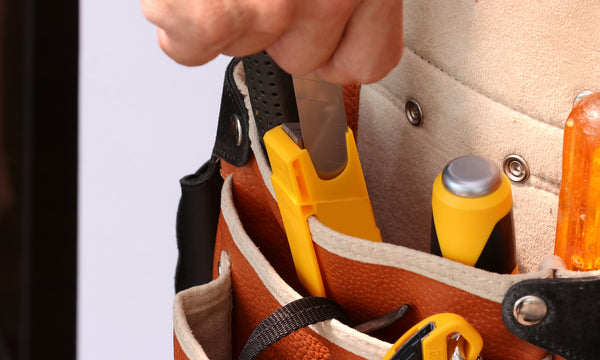
How to Start Your Remodeling Project
There may come a time when you want to undertake a remodeling project for your home. Maybe you realized that the color of your kitchen tile is no longer trendy, or that you want to install a new all-glass shower in the bathroom. Whatever the reason, starting a remodeling project isn’t as simple as one may think. To help you get started on a home remodel, we sought the help of expert Aron Jones. Aron is one of our OLFA Pro All-Stars and has been a Red Seal carpenter since 2001. We asked him a few important questions to help you be better prepared for your home remodel.

Aron, what are the top 5 items that should be on someone’s checklist to start a remodeling project?
- Plan Ahead
It’s important to have a plan. Know what the goal of your remodel is ahead of time and the scope of work. Don't start work on your project until you have a plan in place. Details matter, even in the planning stages. The clearer the description of your goals and project is, the better the chance of your success.
- Timeline
Be realistic when planning your project’s timeline. A good contractor will not be available next Monday. In fact, some contractors are booked years in advance. Depending on your renovation, plan for being without while the work happens. Can you be without your kitchen for 3-6 weeks? Can you live without a bathroom for some time? Can you live through a renovation? Are you going to leave for the duration of the remodel? How is this remodel going to affect your life?
- Relationship
You must have a good working relationship with your contractor. The ability to have an open and frank conversation is important. Good communication is key to a successful relationship and project.
- Budget
Things will cost more than you think and unexpected costs can occur during the project. Try to set a reasonable budget for your project. At some point, you have to trust the professionals you have hired. If you are thinking $10,000 and your contractor is thinking $15,000, ask why. It’s important to understand what’s behind the costs, but chances are there are things you are missing. Listen to the ideas of your contractor. A good contractor will try to get the most of out your budget. It’s always a good idea to have a little extra in the budget as a contingency.
- Realism
Be realistic! If you have a budget of $15,000 for a kitchen remodel, you can’t expect a $30,000 job. Don't skimp on function for looks. Function will go a long way in ensuring your room and home last for a long time. If it looks pretty, but the space doesn't work for your lifestyle, you will never enjoy it.
What can you do if something you had planned goes wrong?
Hiring a professional remodeler is the best way to ensure your project’s success. But even the best and most experienced remodeler will occasionally get caught off guard. Have a portion of your budget set aside for this. Your contractor can help you with the value, but a good rule of thumb is 30% of the value of the project. Always be prepared for the unexpected.
What about those people who want to take on the project themselves?
For a handy-person, a DIY project can be extremely rewarding and can also be very cost-effective. If you’re planning a remodel yourself, keep reading as Aron has some useful tips for you.

- If it's your first project, pick something small. Take on a few small projects to build up your knowledge and skill set before you embark on a bigger adventure.
- Do your research! It’s important to understand the products and tools needed to complete your project. Different tasks will need different tools. You may need a scraper to remove paint, adhesive, or other materials before you even start your project. Or you may need some sharp tools for secure and precise cutting— if you need a place where you can find products for all your needs, OLFA has you covered!

- Take a breath and look at your skill set. Be realistic about how much of the project you can handle and when you’ll need a professional for extra help. Check with your local municipality in regards to codes and permits. For example, you may need an electrician for a part of your project, or inspections may require approvals for certain stages of the project.
- Lastly, plan your budget accordingly. This is especially key since mapping out the budget for yourself is different than when working with a contractor. Plan for the unexpected. The 30% contingency is still a good place to start. When something goes wrong, stay calm, and evaluate the situation. Do you need to change the scope of work? Ask yourself: is it fixable or do I need a professional?
Tackling a large home improvement or remodeling project can be daunting, but it all starts with an idea and a plan. Whether you decide to hire a contractor or tackle it yourself, Aron reminded us that it’s important not to lose sight of what matters. Be sure to enjoy the experience. If you take it step-by-step, you can avoid some of the stress. Focus on the process and the ultimate results.

And don’t forget to take plenty of pictures so you can have a record of the progress. Follow us on Instagram and tag us at @olfa_pro for a chance to be featured on our page—everyone loves a good before and after!
Aron Jones Bio:
"I’m a Red Seal carpenter. I have been in the trade since 1999. Before that, I spent time in the Canadian Armed Forces. I’ve been fortunate to experience all aspects of the trade: residential, commercial and industrial. I enjoy new footing to finish builds, and the challenge of renovating an old house. I am fortunate to be able to mentor and teach the next generation. I’m a huge advocate for the rising apprentice."


